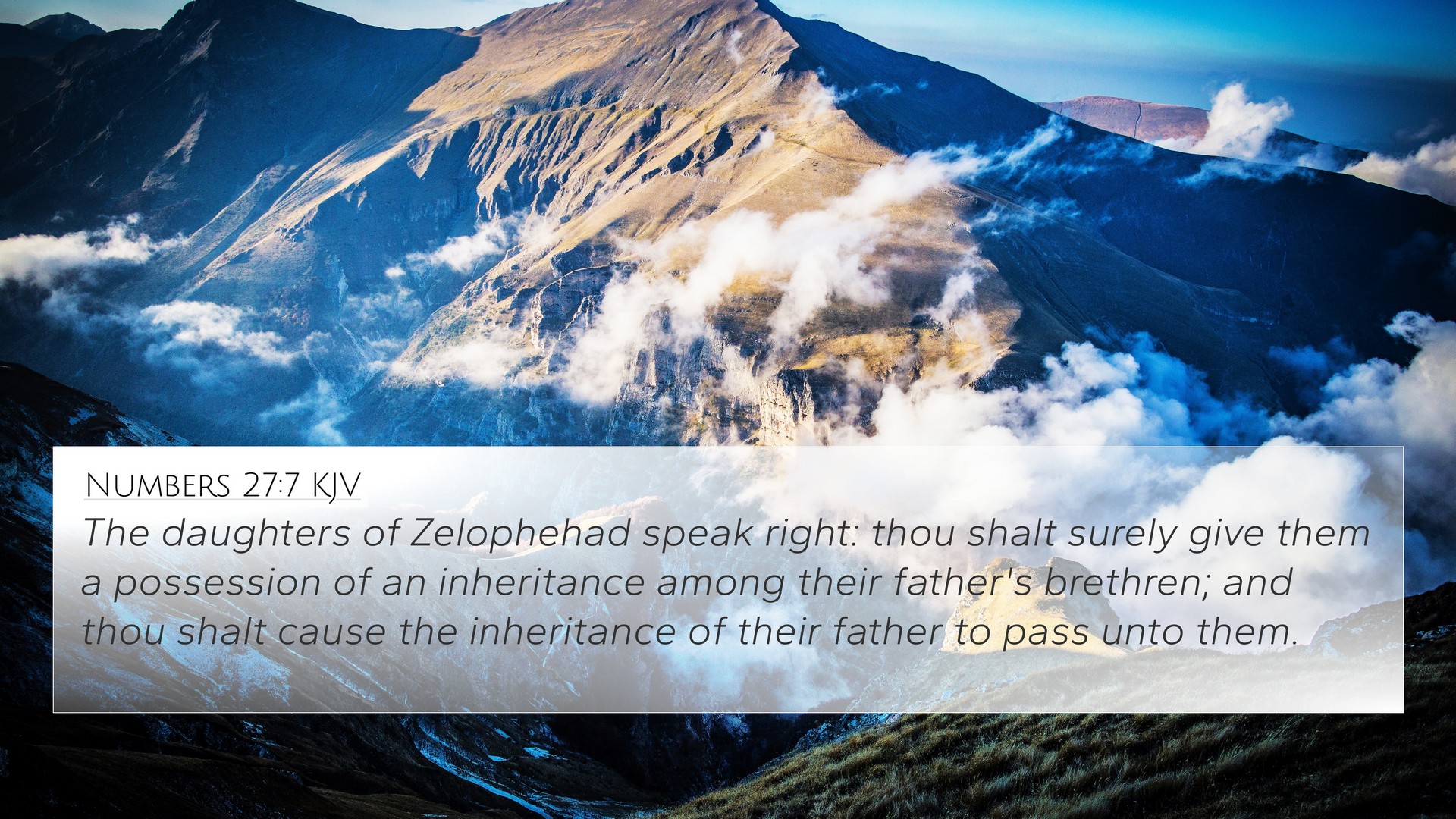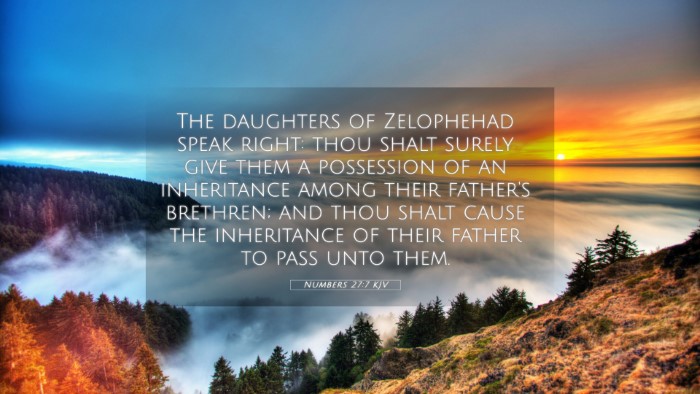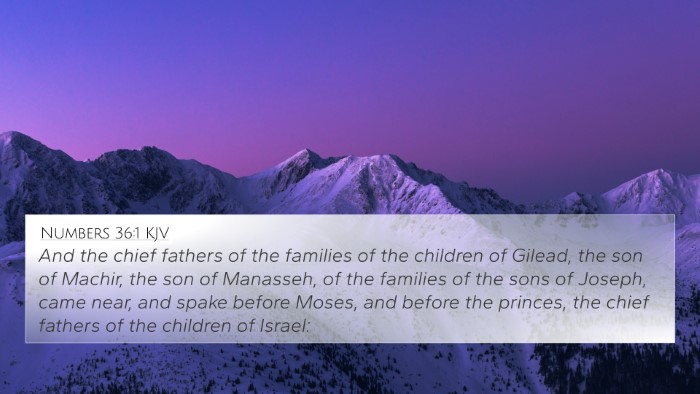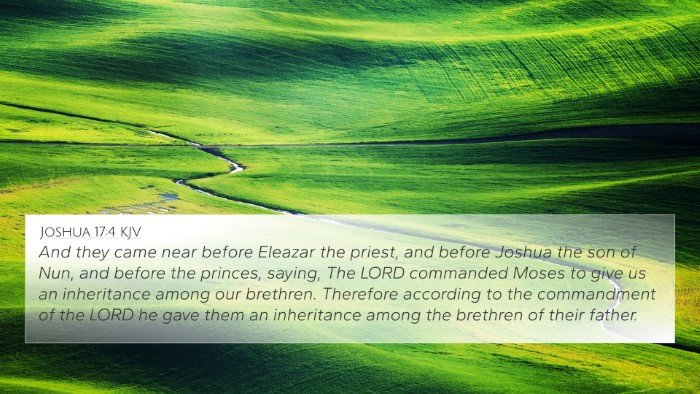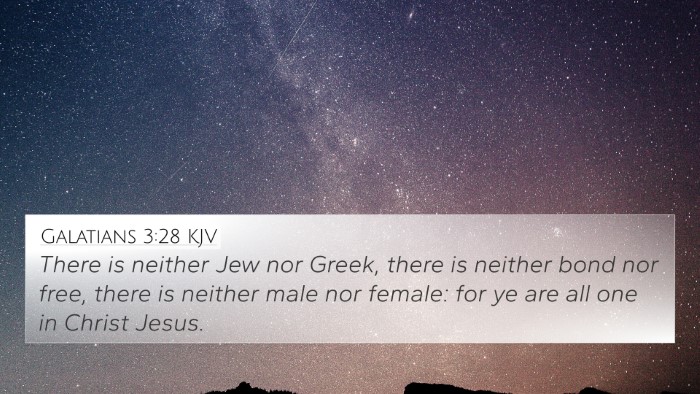Understanding Numbers 27:7
Numbers 27:7 states: "The daughters of Zelophehad speak right: thou shalt surely give them a possession of an inheritance among their father's brethren; and thou shalt cause the inheritance of their father to pass unto them."
Meaning and Context
This verse is critical in the context of inheritance laws in ancient Israel, particularly concerning women's rights. The daughters of Zelophehad approached Moses to claim their rightful inheritance after their father died without leaving any male heirs. This situation reflects a significant shift in societal norms regarding women's inheritance rights.
Insights from Commentaries
-
Matthew Henry:
Henry emphasizes the boldness of the daughters in presenting their case and argues that their faith and persistent plea for justice were commendable. He notes that God honors integrity and righteous requests, which in this case led to a favorable outcome.
-
Albert Barnes:
Barnes highlights the divine endorsement of the daughters' claim as an indication of God's justice and concern for the marginalized. He explains that their story is an important precedent in biblical law, demonstrating the principle of equity.
-
Adam Clarke:
Clarke provides a broader perspective on the legal implications of this request, detailing that this incident is reflective of God's ongoing guidance to the nation of Israel in establishing laws that were both fair and just. He links it to the larger theme of land distribution in the Promised Land.
Biblical Cross References
To comprehend Numbers 27:7 fully, it is helpful to consider various cross-references that highlight its thematic connections within Scripture. Here are some relevant verses:
- Exodus 34:24: Discusses God's provision and guidance in inheritance issues.
- Deuteronomy 21:15-17: Establishes laws regarding inheritance rights in cases of family dynamics.
- Joshua 17:3-6: Continues the theme of inheritance with a practical application of Zelophehad's daughters' situation.
- Galatians 3:28: Highlights equality in Christ, providing a theological connection to women's rights in faith.
- Proverbs 31:10-31: Illustrates the value and capabilities of women within a biblical framework.
- 1 Corinthians 12:12-27: Discusses the body of Christ, emphasizing that every part is important, akin to the daughters' worth.
- Luke 8:1-3: Showcases women who played crucial roles in supporting Jesus' ministry, paralleling the discussion of women's rights and positions in society.
Thematic Connections
The story of Zelophehad's daughters invites us to explore the broader themes of justice, equity, and divine provision throughout Scripture. Their plea for inheritance is consistent with other biblical principles where marginal voices are given notable recognition.
Connections between Bible verses
- These verses collectively illustrate God's character as just and caring, reinforcing the importance of fairness in society.
- They also highlight the role of women in biblical narratives, linking to overarching themes found in both the Old and New Testaments.
- The narrative shows God's willingness to redefine social norms to ensure equity and inclusion among His people.
Using Cross-references Effectively
Understanding cross-referencing techniques is vital for deeper Bible study. Here are some methods for utilizing these references effectively:
- Utilize a Bible Concordance: A concordance can help locate phrases and themes to discover related verses.
- Engage in Comparative Bible Verse Analysis: Analyze how different scriptures relate to one another to form a cohesive understanding.
- Implement Bible Cross-reference Guides: These guides provide structured ways to discover connections and thematic elements across the Scriptures.
Conclusion
Numbers 27:7 is not only a pivotal verse regarding inheritance rights but also a compelling story that echoes the principles of justice and equality throughout the Bible. Through the cross-references, we see God's unchanging character and His commitment to uphold the marginalized while ensuring that His laws reflect fairness and righteousness.
